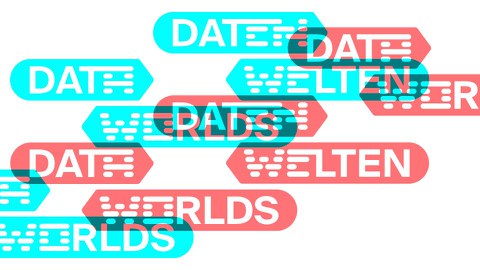Data <> Worlds | 2024-2027
In April 2024, the Schaufler Lab@TU Dresden has entered its second funding phase (2024–2027) under the new guiding theme: Data↔Worlds. Socio-technical and Cultural Syntheses of New Realities.
DATA↔WORLDS
Data shapes worlds and worlds shape data. Today we live in digitally mediated environments driven by big data. Social networks, smart cities, cyber wars, AI art, climate modelling, and digital healthcare are all examples of how big data and digital technologies are transforming policy, politics, human relations, science, and the environment. The new planetary scale of computation and its impacts on contemporary societies demands, therefore, critically engaging with the material and immaterial infrastructures of data and digital media. To address this goal the Schaufler Kolleg@TU Dresden offers early-career scholars from the humanities and social sciences an innovative, interdisciplinary graduate education that bridges art, science, and technology.
Our approach is to understand data as dynamic and world-making. Data has to be collected, analysed and visualized in order to shape the narratives and meanings that make our world and shape human actions–whether political or technical. These processes are historical, social, environmental, and political-economic.
THE LAB
Recognizing how vital data is to making our worlds and shaping our actions, we understand that we need new methods that bridge practice, aesthetics and interdisciplinary research. To this end the Schaufler Lab takes the language and practice of experiment and laboratory seriously. As the historian of science Hans-Jörg Rheinberger has written “research systems are tinkered arrangements that are not set up for the purpose of repetitive operation but for the continuous re-emergence of unexpected events. Experimentation, as a machine for making the future, has to engender unexpected events.” Our goal is to engender such events by experimenting with place, intersectionality, and mediums.
We understand the scholarship and artistic practice at the Schaufler Lab as an experimental machine for future world-making. To this end we work both within the dedicated space of interdisciplinary workshops, but also affirm the necessity of site-based research whether in archives, cities, landscapes, or scientific installations. We create infrastructures for cross-disciplinary discussion by bringing scientists, planners, and engineers into the space of the Schaufler Lab to share their work, and hopefully, hear our viewpoints. Finally, we re-imagine research output, experimenting with different publishing formats, artistic exhibitions, and curatorial initiatives. We do so to move back and forth in the interest of building new imaginaries, stories, and temporalities by which to encounter our environments and each other.
Organization and Outputs
The lab setting thus serves as a platform for experimenting with collaborative, critical, and speculative pedagogical and methodological approaches, ranging from site-specific field schools and research studios to artistic and socially engaged research initiatives. In this respect, the graduate program integrates exchanges and conceptual dialogues with the Schaufler Residency artists, opportunities to contribute and initiates a variety of interdisciplinary event and publication formats as well as access to the established scientific environment at TUD and to other partners in the DRESDEN-concept alliance, such as art and cultural institutions and other research facilities in the State Capital of Dresden.

